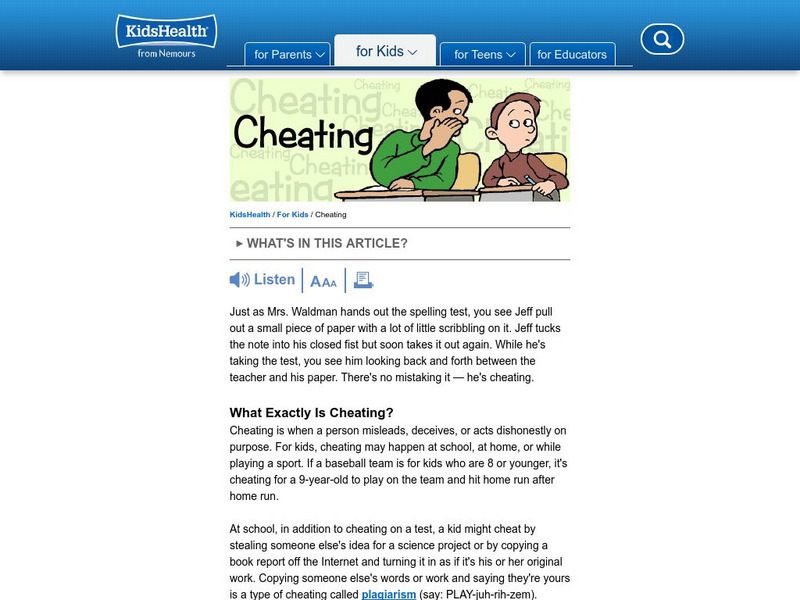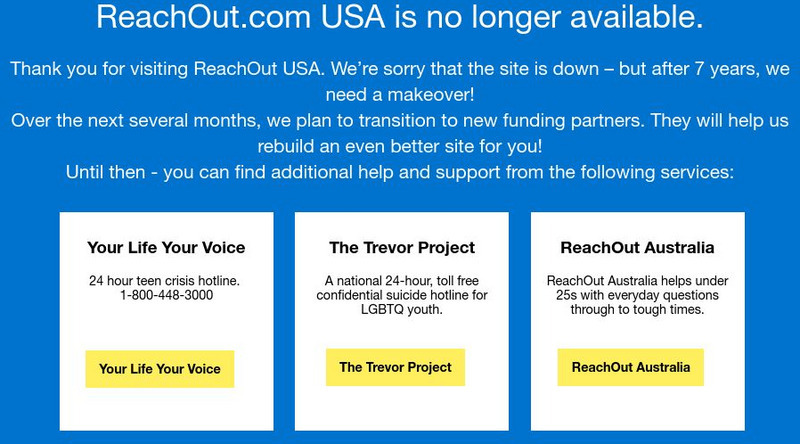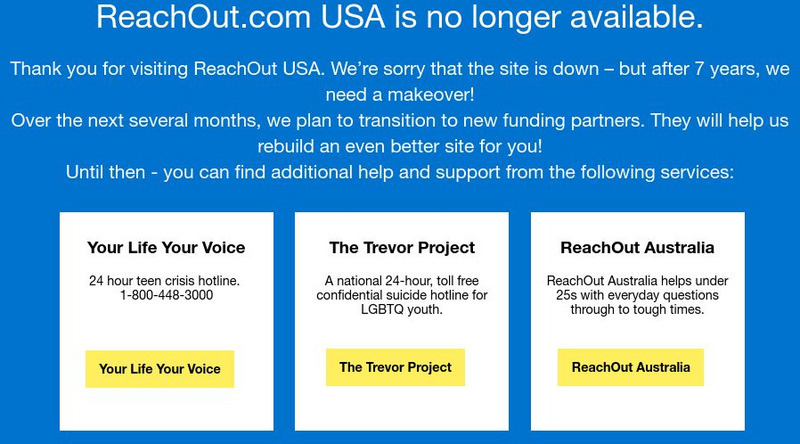Curated OER
Kids Health: Going Back to School
Kids Health offers tips and words of encouragement for kids going back to school, especially those who are shy. Click on "Feelings" for lots of ideas on learning to deal with a variety of emotions and situations relating to school and...
Utah Education Network
Uen: Mental Health Matters
At the conclusion of this lesson, students will understand the continuum of mental health and recognize the warning signs of mental health problems.
Curated OER
Kids Health: Cheating
Have you ever noticed a classmate's eyes wandering to another students paper during a test? Have you ever been tempted to peek at the answers on another person's test? This article tells you how to handle cheating, inside and outside the...
NBC
Nbc Learn: Name It, Tame It: Identifying Emotions
Did you know that learning to identify emotions can help your child build stronger relationships and better manage their emotions? In this video [56 secs.] produced by the Parent Toolkit, you'll learn to build your child's emotional...
PBS
Pbs Learning Media: Sesame Street
Do you know how to get to Sesame Street? This collection is designed to engage preschoolers in everyday learning by teaching core skills in Math, Literacy, STEM, and Social and Emotional Development. Here you'll find hundreds of videos,...
PBS
Pbs Learning Media: Sesame Street: Veterans
In every adventure, some things change, but others stay the same. Use this page as a way to talk about the things that are the same, things that are different, and things that you'd like to keep the same, perhaps family traditions or...
PBS
Pbs Learning Media: Daniel Tiger's Neighborhood: Article: Helping Children Feel Valued and Loved
In this article, see how Daniel Tiger's Neighborhood continues the longstanding tradition of sharing an important message to children: "You are special."
PBS
Pbs Learning Media: Back to School: Activity Starters: Xavier Riddle and the Secret Museum
Be deliberate when inviting your student to watch a PBS KIDS show. These resources can help by adding meaningful conversation and easy activities to their experience watching Xavier Riddle and the Secret Museum.
ReachOut USA
Reach Out Usa: Communicating About Grief With Your Family and Friends
ReachOut fact sheets are written by young people for young people and edited by a mental health professional. This page offers suggestions for how to talk about a recent death with family and friends.
ReachOut USA
Reach Out Usa: Trust Issues
ReachOut fact sheets are written by young people for young people and edited by a mental health professional. This page discusses the importance of trust, how it can be difficult to trust others, rebuilding trust, and how to learn to...
ReachOut USA
Reach Out Usa: Gratitude, Forgiveness and Happiness
ReachOut fact sheets are written by young people for young people and edited by a mental health professional. This page discusses how practicing gratitude and forgiveness can help one be happier.
ReachOut USA
Reach Out Usa: Managing Expectations
ReachOut fact sheets are written by young people for young people and edited by a mental health professional. This page has tips for understanding what expectations are and how to deal with them.
ReachOut USA
Reach Out Usa: Having Difficult Conversations
ReachOut fact sheets are written by young people for young people and edited by a mental health professional. This page offers tips for how to handle sharing difficult news with someone.
ReachOut USA
Reach Out Usa: Fighting With Your Sibling
ReachOut fact sheets are written by young people for young people and edited by a mental health professional. This page discusses why siblings may not get along and offers suggestions for handling conflict with a sibling.
ReachOut USA
Reach Out Usa: When Parents Are Fighting: Dealing With a Breakup or Divorce
ReachOut fact sheets are written by young people for young people and edited by a mental health professional. This page has tips for how to handle your parents splitting up or divorcing, and what to expect.
ReachOut USA
Reach Out Usa: Arguing With Your Parents or Guardians
ReachOut fact sheets are written by young people for young people and edited by a mental health professional. This page has tips for understanding conflict with parents or guardians and how to communicate with them.
PBS
Pbs Learning Media: Daniel Tiger's Neighborhood: Article: Coping With Frustration
This article from the Fred Rogers' Company discusses the importance of being able to cope with frustration in a healthy manner. This practice will help children develop healthy attitudes.
Curated OER
Kids Health: Feelings
Two lessons are provided that engage students in learning about their feelings and the feelings of others.
Other
Kids Helpline: Helping Kids Identify and Express Feelings
Learning to identify and express feelings in a positive way helps kids develop the skills they need to manage them effectively. Here are some tips on how to encourage your child to express their feelings.
PBS
Pbs Learning Media: Summer Camp: Fill Each Day With Possibilities! Making Family Traditions Packet: Pre K and K
Use these family traditions-themed activity sheets to allow children to choose their own learning adventures.
AdLit
Ad lit.org: Understanding the School Counselor Parent Connection
School counselors work with teachers, administrators, and parents to help students with schoolwork and their social/emotional development.
ReachOut USA
Reach Out Usa: Talking to Your Family
ReachOut fact sheets are written by young people for young people and edited by a mental health professional. This page discusses the pros and cons of talking to family members about your problems.
TED Talks
Ted: Ted Ed: What Makes a Good Life? Lessons From the Longest Study on Happiness
As the director of 75-year-old study on adult development, Waldinger has unprecedented access to data on true happiness and satisfaction. In this talk, he shares three important lessons learned from the study as well as some practical,...
Khan Academy
Khan Academy: Mistakes Can Be Good if We Learn From Them!
Mistakes are a natural part of the learning process, and how we react to them can be either harmful or helpful. Listen as kids discuss their experiences with mistakes.
















